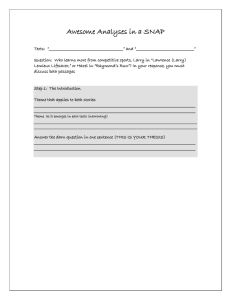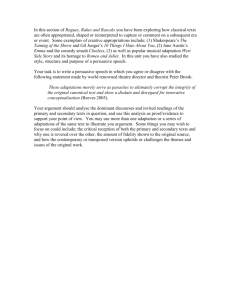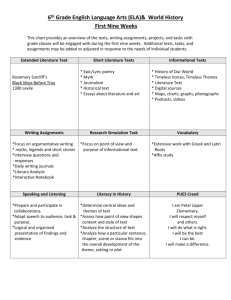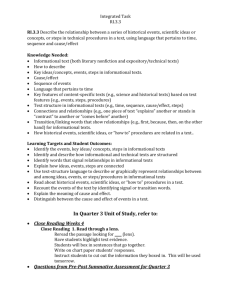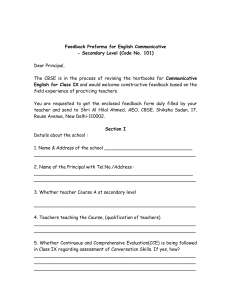at-a-glance-eng-grade10HONORS (new window)
advertisement
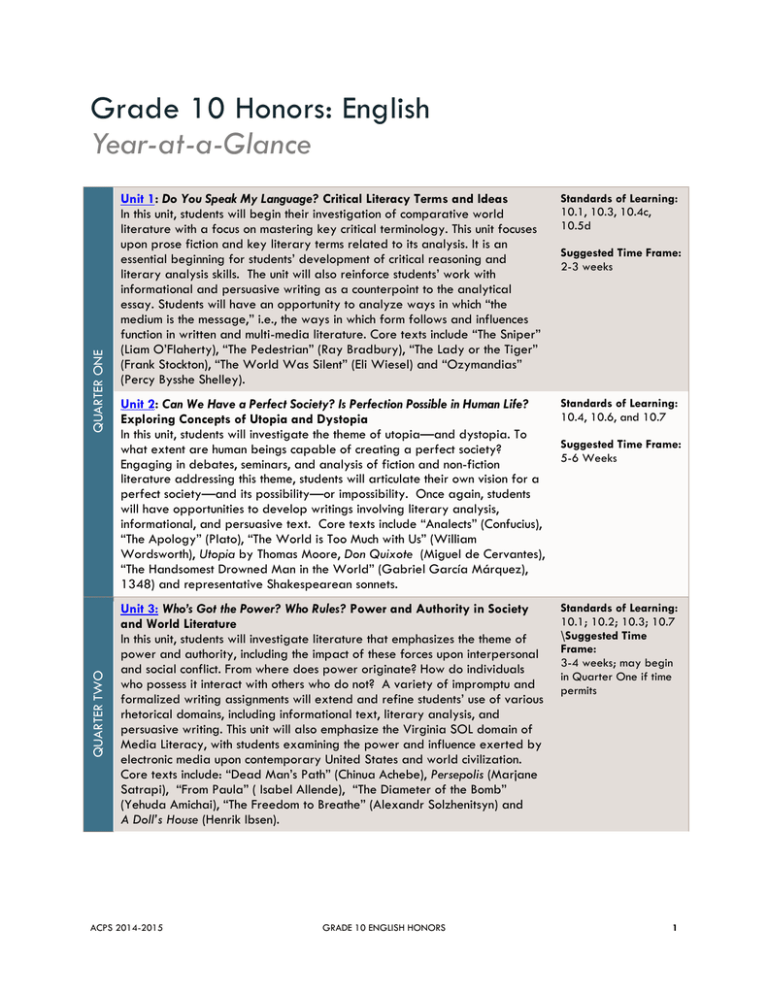
QUARTER TWO QUARTER ONE Grade 10 Honors: English Year-at-a-Glance Unit 1: Do You Speak My Language? Critical Literacy Terms and Ideas In this unit, students will begin their investigation of comparative world literature with a focus on mastering key critical terminology. This unit focuses upon prose fiction and key literary terms related to its analysis. It is an essential beginning for students’ development of critical reasoning and literary analysis skills. The unit will also reinforce students’ work with informational and persuasive writing as a counterpoint to the analytical essay. Students will have an opportunity to analyze ways in which “the medium is the message,” i.e., the ways in which form follows and influences function in written and multi-media literature. Core texts include “The Sniper” (Liam O’Flaherty), “The Pedestrian” (Ray Bradbury), “The Lady or the Tiger” (Frank Stockton), “The World Was Silent” (Eli Wiesel) and “Ozymandias” (Percy Bysshe Shelley). Standards of Learning: 10.1, 10.3, 10.4c, 10.5d Unit 2: Can We Have a Perfect Society? Is Perfection Possible in Human Life? Exploring Concepts of Utopia and Dystopia In this unit, students will investigate the theme of utopia—and dystopia. To what extent are human beings capable of creating a perfect society? Engaging in debates, seminars, and analysis of fiction and non-fiction literature addressing this theme, students will articulate their own vision for a perfect society—and its possibility—or impossibility. Once again, students will have opportunities to develop writings involving literary analysis, informational, and persuasive text. Core texts include “Analects” (Confucius), “The Apology” (Plato), “The World is Too Much with Us” (William Wordsworth), Utopia by Thomas Moore, Don Quixote (Miguel de Cervantes), “The Handsomest Drowned Man in the World” (Gabriel García Márquez), 1348) and representative Shakespearean sonnets. Standards of Learning: 10.4, 10.6, and 10.7 Unit 3: Who’s Got the Power? Who Rules? Power and Authority in Society and World Literature In this unit, students will investigate literature that emphasizes the theme of power and authority, including the impact of these forces upon interpersonal and social conflict. From where does power originate? How do individuals who possess it interact with others who do not? A variety of impromptu and formalized writing assignments will extend and refine students’ use of various rhetorical domains, including informational text, literary analysis, and persuasive writing. This unit will also emphasize the Virginia SOL domain of Media Literacy, with students examining the power and influence exerted by electronic media upon contemporary United States and world civilization. Core texts include: “Dead Man’s Path” (Chinua Achebe), Persepolis (Marjane Satrapi), “From Paula” ( Isabel Allende), “The Diameter of the Bomb” (Yehuda Amichai), “The Freedom to Breathe” (Alexandr Solzhenitsyn) and A Doll’s House (Henrik Ibsen). Standards of Learning: 10.1; 10.2; 10.3; 10.7 \Suggested Time Frame: 3-4 weeks; may begin in Quarter One if time permits ACPS 2014-2015 GRADE 10 ENGLISH HONORS Suggested Time Frame: 2-3 weeks Suggested Time Frame: 5-6 Weeks 1 QUARTER THREE Unit 4: Who Are We and How Can We Grow and Understand Ourselves? The Inner and Outer Landscape in Literature In this unit, students will read and analyze literature that juxtaposes psychological insights (the internal human landscape) against environmental factors in which a setting is in great transition or turmoil. Students will read Othello (or other examples of a Shakespearean tragedy) as well as informational, fiction, and persuasive literature that treats this theme. A major focus of the unit will involve student investigation, discussion, and debate about ways in which literature (of varying genres and eras) can express universal insights into what it means to be human—including the foibles, conflicts, and challenges confronted in one way or another by all human beings. Core texts include “A Piece of String” (Guy de Maupassant), “The Artist” (Rabindranath Tagore), “The End and the Beginning” (Wislawa Szymborska), “The River-Merchant’s Wife: A Letter” by Li Po and Othello (William Shakespeare). Standards of Learning: 10.3; 10.4; 10.6 Unit 5: What Does It Mean to Grow Up? The Maturity and Development of Countries and the Individual In this unit, students will explore the theme of personal growth juxtaposed against the growth of societies and nations. Students will investigate the genre of the bildungsroman, i.e., narratives that focus upon coming of age and the growth of self-awareness within the individual. These stories are juxtaposed against the struggles of nation building and the impact of a country or land upon the youth who live there. A recurrent theme involves varying concepts of maturity—and how human beings achieve that status— or fail to achieve it. Once again, media literacy and opportunities for writing in a variety of domains will weave through the unit. Core texts include A Tale of Two Cities (Charles Dickens), “A Problem” (Anton Chekhov), Of Beetles and Angels (Mawi Asegdon), To Kill a Mockingbird (Harper Lee) and Milkweed (Jerry Spinelli). Standards of Learning: 10.1, 10.4 and 10.6 Unit 6: Who Dropped the Bomb? What Happens When Good People Do Nothing? This unit emphasizes the theme of human responsibility and global interconnectedness. To what extent do our individual choices and actions affect others? What is our responsibility to act in response to emerging social and political conflicts? Unit 7 offers a wide range of opportunities for students to engage in the analysis and critique of informational text, including debating the objectivity of news and historical accounts. How, for example, might we view events and historical circumstances differently within and across cultural eras and cultures? The unit also provides an ideal context for students to refine their debating skills as well as their capacity for analyzing and critiquing alternative perspectives about events and trends. Core texts include Night (Elie Wiesel), “Diameter of the Bomb” (Yehuda Amichai), One Day in the Life of Ivan Denisovich and Freedom to Breathe” (Aleksandr Solzhenitsyn),“ “The Spy” (Bertolt Brecht), The World Was Silent (Elie Wiesel), “The Guest” (Albert Camus), “After the Deluge” (Wole Soyinka), “The End and the Beginning” (Wilslawa Szymborska) and“Russia 1812” (Victor Hugo). Standards of Learning: 10.2, 10.4, 10.5, and 10.6 ACPS 2014-2015 GRADE 10 ENGLISH HONORS Suggested Time Frame: 3-4 weeks Suggested Time Frame: 4-5 weeks Suggested Time Frame: 4-5 weeks 2 QUARTER FOUR Unit 7: Teach Me a Lesson—Literature as a Reflection of Moral Reasoning In this unit, students will investigate ways in which literature can teach lessons about the human experience and authors’ commentary about ways in which human beings should—or should not—interact. They will also debate conflicting perspectives about how literature reflects varying ethical and moral perspectives. Their exploration of literature as a reflection of moral reasoning will allow students to debate the purpose of literature itself. For example, is all literature (fiction and non-fiction) a form of moral commentary—or can some literature be objective and free of the author’s values, perspectives, and points of view? Once again, students will refine their media literacy skills by applying unit themes to the analysis and critique of technology-based narrative and informational text. Core texts include “How Much Land Does a Man Need?” by Leo Tolstoy), Of Beetles and Angels (Mawi Asgedom), Things Fall Apart and Civil Peace (Chinua Achebe,) and “The Artist” (Rabindranath Tagore). Standards of Learning: 10.4, 10.6, and 10.7 Unit 8: Seek and You Shall Find: Investigating a Key Theme in Literature In this unit, students will continue to reinforce their growing research skills, focusing upon framing a controlling research question and using it as a catalyst for collecting, analyzing, and presenting evidence to support a controlling thesis. This project will also allow for students to demonstrate creativity and independence by allowing students choice in topic and focus as well as culminating performances and products extending from the research process. Ideally, students will incorporate one or more of the major themes explored during this academic year as a focus for their research question and process. Students will search, read and synthesize texts related to their personal research project. Standards of Learning: 10.5, 10.6, 10.7, and 10.8 ACPS 2014-2015 GRADE 10 ENGLISH HONORS Suggested Time Frame: 4-5 weeks Suggested Time Frame: 3-4 weeks 3


